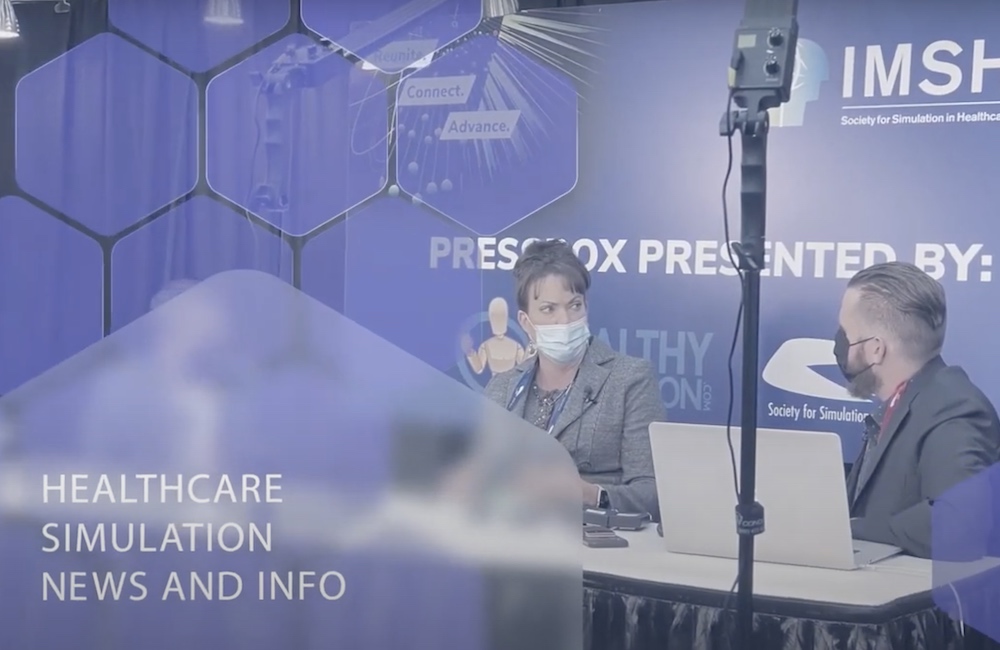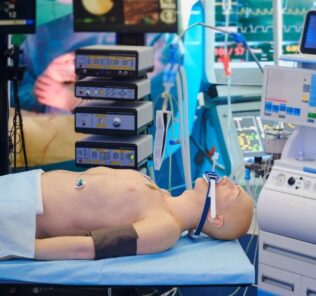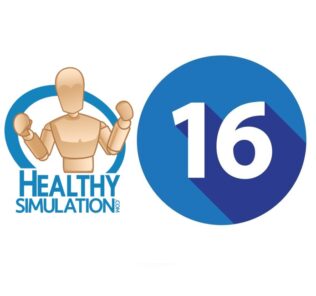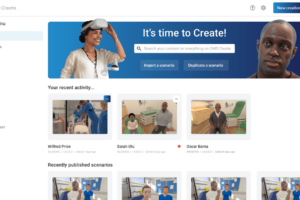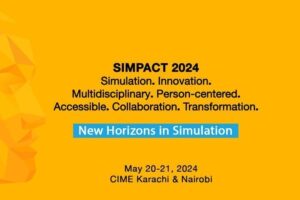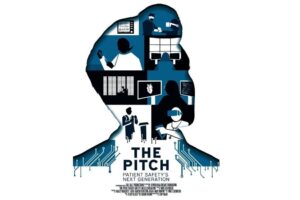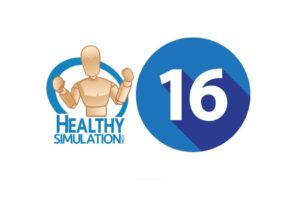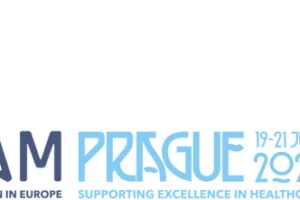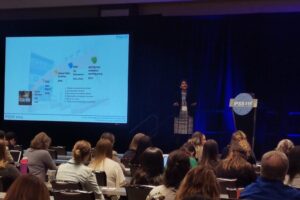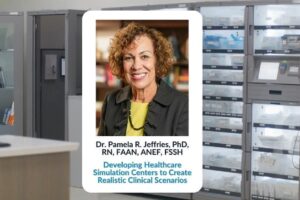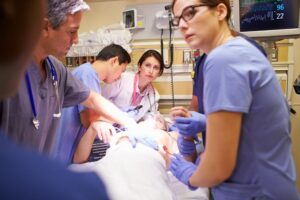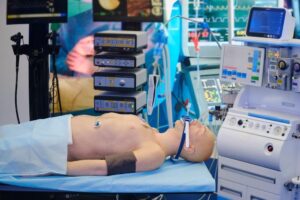IMSH 2022 PressBox: More Clinical Simulation Insight from Industry Leaders
During IMSH 2022, HealthySimulation.com and the Society for Simulation in Healthcare (SSiH) had the exciting opportunity to interview leaders from across the clinical simulation industry on a variety of topics as part of a PressBox. This addition to the simulation conference allowed experts to share their insight on industry advances such as XR products, solutions, and other resources currently being used by learners for medical simulation training. Other topics discussed at the PressBox included the impact COVID-19 had on healthcare simulation overall and SSH certification. This article shares segments of these conversations, with the full video interviews embedded and able to be viewed via YouTube.
IMSH 2022 PRESSBOX Presented by SSH & HealthySimulation.com – S. DiMarco, E. Wells-Beede, T. Chidume: During this PressBox discussion, Shannon DiMarco, MSHS, CHSOS, the administrative Director, Emergency Education and Clinical Simulation at UW Madison Health, Elizabeth Wells-Beede, Ph.D., RN, C-EFM, CHSE, Educational Nurse Scientist at Texas A&M University College of Nursing, and Tiffani Chidume, DNP, RN, CCRN-K, CHSE, CHSOS, an Assistant Clinical Professor and the Simulation Center Coordinator at Auburn University School of Nursing, share positive outcomes healthcare simulation professionals have seen from their programs and beyond during the COVID-19 pandemic.
Lance Baily: Shannon, I’m curious to know about some of your work there [at UW Madison] and what people have been seeing as successful.
Sponsored Content:
Shannon DiMarco: Back at the end of 2019, we had done an ECMO simulation, a transport simulation, and had worked with our EMS community to talk about how could we use this new ECMO that we created in order to help with getting a patient on ECMO. Within 72 hours, we actually had a patient who had gone out for a night with some fun, with some friends and had ended up face down in the water.
By the time EMS had gotten to him, he had a very, very weak heartbeat. They called UW hospital and they said, we’re bringing this patient in, but we don’t know what the sustainability of his life will be. They said, ‘Nope, we’re going to get our ECMO protocol up. We just tested this two days ago.’ They brought him back and he is, he walked outta the hospital with very minimal injuries. It was very great.
Lance Baily: I love hearing about those types of things. Elizabeth, how about yourself, any of those types of success stories from your program?
Elizabeth Wells-Beede: We’ve had a lot of opportunities to continue collaborating and I think that’s one of the biggest things that’s been somewhat amazing when you have areas of distance campuses. I, myself, work for Texas A&M but I’m not on the main campus. ‘m actually at a satellite campus. It’s always been difficult to make some of those connections on the main campus to move simulation forward and to the next era that we’re looking at.
It’s given me and some students within the different departments within the university itself the opportunity to collaborate and create some virtual reality simulations. We kind of looked at things on that cutting edge of how can we look in areas that aren’t being explored currently.
Sponsored Content:
It’s been amazing that we’ve received actually federal funding to be able to do these grants. I think the presentation this morning was amazing to hear how we all need to learn how to speak now in this new digital world. Appropriately, it really reminded me of the basic assumption that we need to communicate with each other better. Right. And I think that’s one of the big things for me.
Lance Baily: Tiffani, I’d love to hear from you in terms of some of the amazing success stories or stories of inspiration that have happened at your program at Auburn.
Tiffani Chidume: One of the biggest things that we found out and one of our pride and joys is an end-of-life simulation that we ran using two standardized patients, one as the patient and one as the family member taking care of them. We already found before COVID-19 that the students paid more attention to taking off the orders that were on the physician order sheet, rather than catering to that family member.
When COVID happened, we weren’t face-to-face, and our university was shut down. My question was how do I get this empathy aspect to translate to our students? I wrote an end-of-life simulation based on the death of my brother-in-law and the questions that my sister had about this dying process. What’s the difference between palliative care and hospice care, and well, what does hospice really mean?
IMSH 2022 PRESSBOX Presented by SSH & HealthySimulation.com – SSH Certification: This video discusses SSH Certification and the CHSE, CHSE-A, CHSOS, and CHSOS-A programs with individuals who know the programs inside and out. This conversation included Jared Kutzin, DNP, MS, MPH, RN, the Director of Emergency Medicine Simulation at Mount Sinai Hospital, Timothy Whitaker, BS, CHSE, CHSOS, EMT-P, and Tailored Solutions Consultant /Clinical Educator for CAE Healthcare, and Carman Turkelson DNP, MSN, RN, CCRN-K, CHSE-A, an Assistant Professor and Associate Director of Nursing Simulation Center at the University of Michigan-Flint. Together, these simulation champions discuss how these certifications are useful, and why simulationists should consider obtaining them.
Lance Baily: Tell me a little bit more about the CHSE, what the designation is, who it’s for and who should be thinking about it?
Jared Kutzin: So the CHSE is the Certified Healthcare Simulation Educator Certification program. Anybody who has at least two years of experience is eligible to sit for the CHSE. It’s a written exam, and since the pandemic, we’ve actually worked with our partners at the testing agencies to allow individuals to take it from home. You log on, show them your environment, they confirm that nobody else is there to help you and that you don’t have any notes under the desk and you can actually take the exam right from the comfort of your own house.
It’s 115 questions, and 15 of those are sort of experimental questions. It’s a really good opportunity for individuals who are healthcare simulation educators to be able to demonstrate that they have the basic competencies, and to provide education to our learners, whether that’s a student or practicing clinicians – whoever it might be.
Then obviously the CHSOS is the operation specialist version. I’m fortunate enough that I am certified as a simulation operations specialist, and although I chair the educational committee, I think the operational specialist certification is a great opportunity for those who are really focused on the technical aspects of simulation.
Lance Baily: So Tim, tell me a little bit about the CHSOS-A, the new designation that’s just recently come about.
Timothy Whitaker: The CHSE-A is the advanced designation of the clinical simulation educator, the operational was just launched. Our first inaugural group was actually crowned, per se, at SIMOPS. Both of those designations are portfolio-based assessments. Basically, you’re building a portfolio and showing your exemplars of how you’ve advanced into the simulation world, how you’re achieving a little bit higher standard with that credential. That’s what the CHSE-A is about – “I’m one of the more leaders in that operational field.”
Lance Baily: Carmen, I’d love to hear a little bit about your experience having the CHSE designation. I think you’ve got the CHSE-A as well. So tell me about both of those and how has that helped to kind of demonstrate your qualifications to your community or your professional kind of colleagues?
Carman Turkelson: I was in the first group to receive the CHSE certification. So I was in the group that was part of the cut score, and I actually did that when I was in my doctorate program. I’m a nurse so I was in my DMP program at the time. My doctorate work was focusing on simulation-based education and patient safety. So for me, it was an opportunity to demonstrate that I had that expertise in simulation and as a nurse. I already had certification as a critical care nurse, so I already knew the value of having a certification and how that certification can set you apart when you’re going up for jobs or promotions.
Even if you’re not getting a pay raise, it definitely set me apart in terms of getting into my doctorate program by having a CCN certification at that time. Sure. The CHSE has done the same thing for me. I went up for my CHSE shortly after submitting my tenure portfolio at the University of Michigan, because I basically had that portfolio already together to go up for tenure. My rationale for doing it is to demonstrate the expertise that I have in simulation and to set myself apart and set my university’s SIM center apart from other universities’ simulation centers.
IMSH PressBox Videos:
- IMSH 2022 PressBox: XR Panel on New Digital & Remote Healthcare Simulation Technology
- Impacts of COVID on Healthcare Simulation Global Survey Results
IMSH Vendor Demo Videos:
- IMSH 2022 Vendor Demos: Lifecast Body Simulation, VRpatients, Purdue Global, SimGHOSTS
- IMSH 2022 Vendor Demos: EMS, Sentinel U, Echo Healthcare, Health Scholars
- IMSH 2022 Vendor Demos: CAE Healthcare, Avkin, EMS
- IMSH 2022 Vendor Demos: Nasco Healthcare, Operative Experience, CyberPatient, SafeMedicate
More About IMSH
The Society for Simulation in Healthcare (SSH) hosts IMSH annually and offers over 250 sessions encompassing interactive and immersive courses and plenary sessions. The IMSH meeting is aligned with the SSH’s mission to “provide hands-on learning in leading-edge medical simulation trends and technology, networking and collaboration.” Furthermore, the programs are all peer-reviewed and are selected to serve the needs of novices to experts.
“Every year, professionals from all experience levels and from more than 50 countries attend IMSH,” Kathy Adams, Director of Continuing Education, SSH, said. “Any professional interested in or currently working in healthcare simulation will find value in the healthcare simulation conference; the range of learning formats — from small, interactive workshops, to large, inspiring plenaries – and the breadth of topics presented by global experts ensures that there is something for every learning style, interest and experience level.”
At IMSH meetings, key areas of discussion are often new ideas, leadership development, new processes, and research findings, innovative approaches, design strategies, return on investment, and improved communication techniques. As a catalyst for advancement and evolution in healthcare simulation technology, the IMSH brings together and connects industry professionals to learn. The event is considered to be one of the top educational and networking events for the healthcare simulation world, especially for those with interests in IPE.
More Upcoming Healthcare Simulation Events
Lance Baily, BA, EMT-B, is the Founder & CEO of HealthySimulation.com, which he started while serving as the Director of the Nevada System of Higher Education’s Clinical Simulation Center of Las Vegas back in 2010. Lance is also the Founder and acting Advisor to the Board of SimGHOSTS.org, the world’s only non-profit organization dedicated to supporting professionals operating healthcare simulation technologies. His co-edited Book: “Comprehensive Healthcare Simulation: Operations, Technology, and Innovative Practice” is cited as a key source for professional certification in the industry. Lance’s background also includes serving as a Simulation Technology Specialist for the LA Community College District, EMS fire fighting, Hollywood movie production, rescue diving, and global travel. He and his wife Abigail Baily, PhD live in Las Vegas, Nevada with their two amazing daughters.
Sponsored Content:



